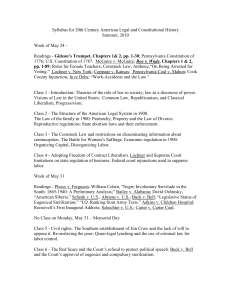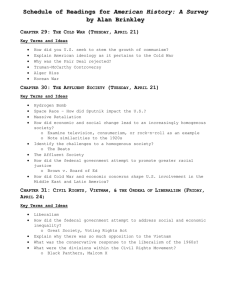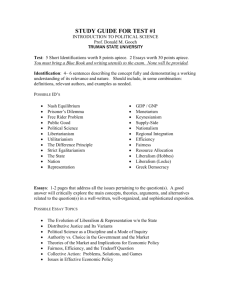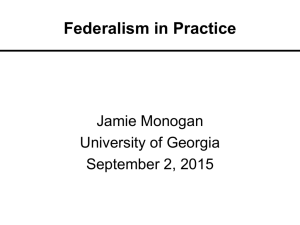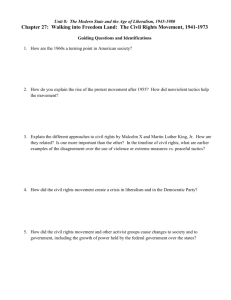Syllabus for 20th Century American Legal and Constitutional History Summer, 2009
advertisement
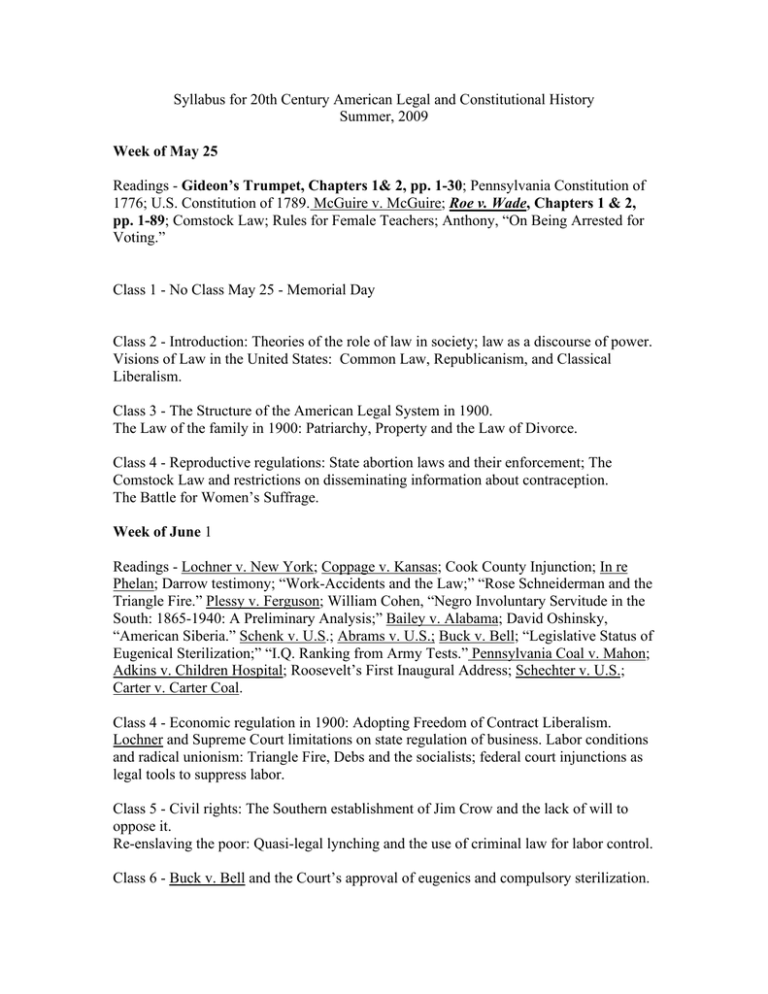
Syllabus for 20th Century American Legal and Constitutional History Summer, 2009 Week of May 25 Readings - Gideon’s Trumpet, Chapters 1& 2, pp. 1-30; Pennsylvania Constitution of 1776; U.S. Constitution of 1789. McGuire v. McGuire; Roe v. Wade, Chapters 1 & 2, pp. 1-89; Comstock Law; Rules for Female Teachers; Anthony, “On Being Arrested for Voting.” Class 1 - No Class May 25 - Memorial Day Class 2 - Introduction: Theories of the role of law in society; law as a discourse of power. Visions of Law in the United States: Common Law, Republicanism, and Classical Liberalism. Class 3 - The Structure of the American Legal System in 1900. The Law of the family in 1900: Patriarchy, Property and the Law of Divorce. Class 4 - Reproductive regulations: State abortion laws and their enforcement; The Comstock Law and restrictions on disseminating information about contraception. The Battle for Women’s Suffrage. Week of June 1 Readings - Lochner v. New York; Coppage v. Kansas; Cook County Injunction; In re Phelan; Darrow testimony; “Work-Accidents and the Law;” “Rose Schneiderman and the Triangle Fire.” Plessy v. Ferguson; William Cohen, “Negro Involuntary Servitude in the South: 1865-1940: A Preliminary Analysis;” Bailey v. Alabama; David Oshinsky, “American Siberia.” Schenk v. U.S.; Abrams v. U.S.; Buck v. Bell; “Legislative Status of Eugenical Sterilization;” “I.Q. Ranking from Army Tests.” Pennsylvania Coal v. Mahon; Adkins v. Children Hospital; Roosevelt’s First Inaugural Address; Schechter v. U.S.; Carter v. Carter Coal. Class 4 - Economic regulation in 1900: Adopting Freedom of Contract Liberalism. Lochner and Supreme Court limitations on state regulation of business. Labor conditions and radical unionism: Triangle Fire, Debs and the socialists; federal court injunctions as legal tools to suppress labor. Class 5 - Civil rights: The Southern establishment of Jim Crow and the lack of will to oppose it. Re-enslaving the poor: Quasi-legal lynching and the use of criminal law for labor control. Class 6 - Buck v. Bell and the Court’s approval of eugenics and compulsory sterilization. The Red Scare and the Court’s refusal to protect political speech. Class 7 - The Court in the 1920’s: the Highwater mark of Freedom of Contract Liberalism. The Great Crash: The breakdown of capitalism and Hoover’s response. The beginning of the end of Freedom of Contract liberalism: Roosevelt’s election and the Hundred Days. Week of June 8 Readings - Roosevelt’s Second Inaugural; West Coast Hotel v. Parrish; U.S. v. Carolene Products; NLRB and Taft-Hartley Acts; Korematsu v. U.S. (1944); Shelley v. Kraemer; Sweatt v. Painter; Brown v. Board. Class 9 - Dismantling Freedom of Contract Liberalism. Establishing the New Deal agencies. The Second New Deal and the showdown with the Court. The meaning of the Carolene Product’s footnote. Class 10 - Labor: Sit-down strikes, the NLRB and the Wagner Act. Civil rights in the 30’s: Scottsboro and A. Philip Randolph Class 11 - Civil rights in the 40’s: World War II and the Japanese Internment. The NAACP’s legal campaign against Plessey. Deciding Brown v. Board of Education. Class 12 - Questions about the first half of the course; Midterm Examination in Lecture. Week of June 15 Readings - Public Statement by 8 Alabama Clergymen; Martin Luther King, Jr., “Letter from the Birmingham City Jail;” “I Have a Dream.” Gideon’s Trumpet, Chapters 3 Epilogue, pp. 31-250; Gideon v. Wainwright; LBJ, “Commencement Speech at Howard;” Heart of Atlanta Motel v. U.S.. Class 13 - Brown and the Southern Civil Rights movement: Finding political will in Little Rock; sitting down in Nashville and on the buses; voting in Mississippi. Class 14 - Legislating Equality Liberalism - The Civil Rights Act of 1964; the march on Selma and the Voting Rights Act of 1965. The Court expands the Constitution - Heart of Atlanta Motel. Class 15 - Creating Equality Liberalism: Incorporation controversy and the creation of criminal constitutional law. Class 16 - Civil rights and free speech: McCarthyism and Sullivan v. New York Times. Week of June 22 Readings - Friedan, “A Woman’s Civil Right;” Amatniek, “Funeral Oration for the Burial of Traditional Womanhood;” Roe v. Wade, Chapters 3-4, pp. 89 -179; Griswold v. Connecticut; Loretta Lynn, “The Pill;” Weddington, “The Argument that Won Roe v. Wade;” Roe v. Wade; California’s No-Fault Divorce Law; Jenson v. Eveleth; Pertschuk, “On the Side of the Angels;” Proposition 13; Ronald Reagan’s First Inaugural; Proposition 209; U.S. v. Lopez. Class 17 - Feminism and birth control: The woman’s movement, the demand to extend liberal ideology to encompass women and the technology that allowed this expansion. Women freed to be Men: Griswold and Roe and women’s control over reproduction. Class 18 - Incorporating feminism into Equality Liberalism: No-fault divorce: Changes in the divorce law and the adoption of No-Fault in the early 70’s. Using law to create norms: Sexual harassment law and redefining gender relations. Class 19 - Regulating the economy for the public good: The third wave of Federal agencies: Ralph Nader, consumerism and the Consumer Product Safety Administration; Silent Spring and the EPA and the ESA; The EEOC and Affirmative action - pushing equality beyond opportunity. Class 20 - Opposing Equality Liberalism: Reacting to the expansion of government: Bakke and the limits of Affirmative Action; Proposition 13 and the Reagan Revolution. The Rehnquist Court limits on Federal power: The new Federalism jurisprudence and limits on the commerce clause. Week of June 29 Readings - Just v. Marinette County; Lucas v. South Carolina Coastal Council; Kelo v. New London, Connecticut; Roe v. Wade, Chapters 4 - Conclusion, pp. 180 - 285; Bowers v. Hardwick; Lawrence v. Texas; “The Defense of Marriage Act;” Michael H. v. Gerald D.; Michelman, “In support of Roe v. Wade;” Foster, “The Feminist Case against Abortion;” Planned Parenthood v. Casey; Grutter v. Bollinger; Parents Involved v. Seattle School District. Class 21 - The attack on environmentalism: Lucas and Kelo and the politics of regulatory takings. The battle against feminism: The Court Retreats from Roe. Hillary and Healthcare: The end of New Deal Liberalism? Class 22 - Preserving (for a time?) Equality Liberalism: The Court defends affirmative action and sexual privacy. Class 23 - Where are we now? Review for final. Class 24 - Final Examination in Lecture. Information Sheet for LS 176: American Legal and Constitutional History Professor Ben Brown Office hours: Tuesdays and Wednesdays 1:00 – 2:00 or by appointment Office: JSP building, 2240 Piedmont, 2nd Floor e-mail - rbbrown@ berkeley.edu. Grading: Grades will be based on four factors: Mid-term exam - 25% Paper - 25% Participation in discussion section - 10% Final exam - 40% The paper will be assigned at the mid-term. You will also be required to turn in brief written assignments to your GSI according to his instructions. Supplemental Materials: For an overall narrative of United States legal history, see: Kermit Hall, A Magic Mirror. For an encyclopedic overview of law in America, see: Lawrence Friedman, A History of American Law. For an overview of constitutional history see: Melvin Urofsky and Paul Finkleman, A March of Liberty: A Constitutional History of the United States. For a leftist perspective on constitutional history, and good mini-biographies of the justices, see: Peter Irons, A People’s History of the Constitution. To see transcripts of U.S. Supreme Court oral arguments and to hear tapes of some of these oral arguments, go to: http://www.oyez.org/. To find full versions of Supreme Court decisions go to: http://www.findlaw.com.
